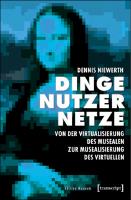Dinge – Nutzer – Netze
Von der Virtualisierung des Musealen zur Musealisierung des Virtuellen
Author(s)
Niewerth, Dennis
Collection
Knowledge Unlatched (KU)Number
104882Language
GermanAbstract
Museums have always been virtual places – so why do these institutions find it so difficult to use digital media? And what does a museum have to offer to a knowledge-based society whose act of remembering increasingly takes place in the digital domain? Museen sind stets auch virtuelle Räume: Als Einrichtungen des gemeinsamen Erinnerns schlagen sie Brücken zwischen dem An- und Abwesenden, der Materialität ihrer Exponate und einer Vergangenheit, die nur in ihren Hinterlassenschaften ihr Wirklichsein zu behaupten vermag. Dennoch sind in einer Gesellschaft, für die Virtualität Normalität geworden ist, die Institution Museum und ihr Umgang mit den längst nicht mehr ›neuen‹ Medien nach wie vor Austragungsorte erhitzter Debatten über das ›Echte‹, das ›Authentische‹ und die Erfahrbarkeit des Wirklichen. Dennis Niewerth geht der Frage nach, worin die »Virtualisierung des Musealen« besteht. Und er zeigt, was das Museum als Bollwerk der Kulturpädagogik im Sinne einer »Musealisierung des Virtuellen« einer Gesellschaft anzubieten hat, die unter der Fülle ihrer Erinnerungen begraben zu werden droht.
Keywords
Arts; Museum; Virtuality; Cultural Heritage; Digitalization; New Media; Cultural Management; Museology; Digital Media; Media History; Virtualität; Kulturerbe; Digitalisierung; Neue Medien; Kulturmanagement; Museumswissenschaft; Digitale Medien; MediengeschichteDOI
10.14361/9783839442326ISBN
9783839442326, 9783837642322OCN
1083015103Publisher
transcript VerlagPublisher website
https://www.transcript-verlag.de/Publication date and place
Bielefeld, 2018Grantor
Series
Edition Museum, 30Classification
Museology and heritage studies


 Download
Download Web Shop
Web Shop